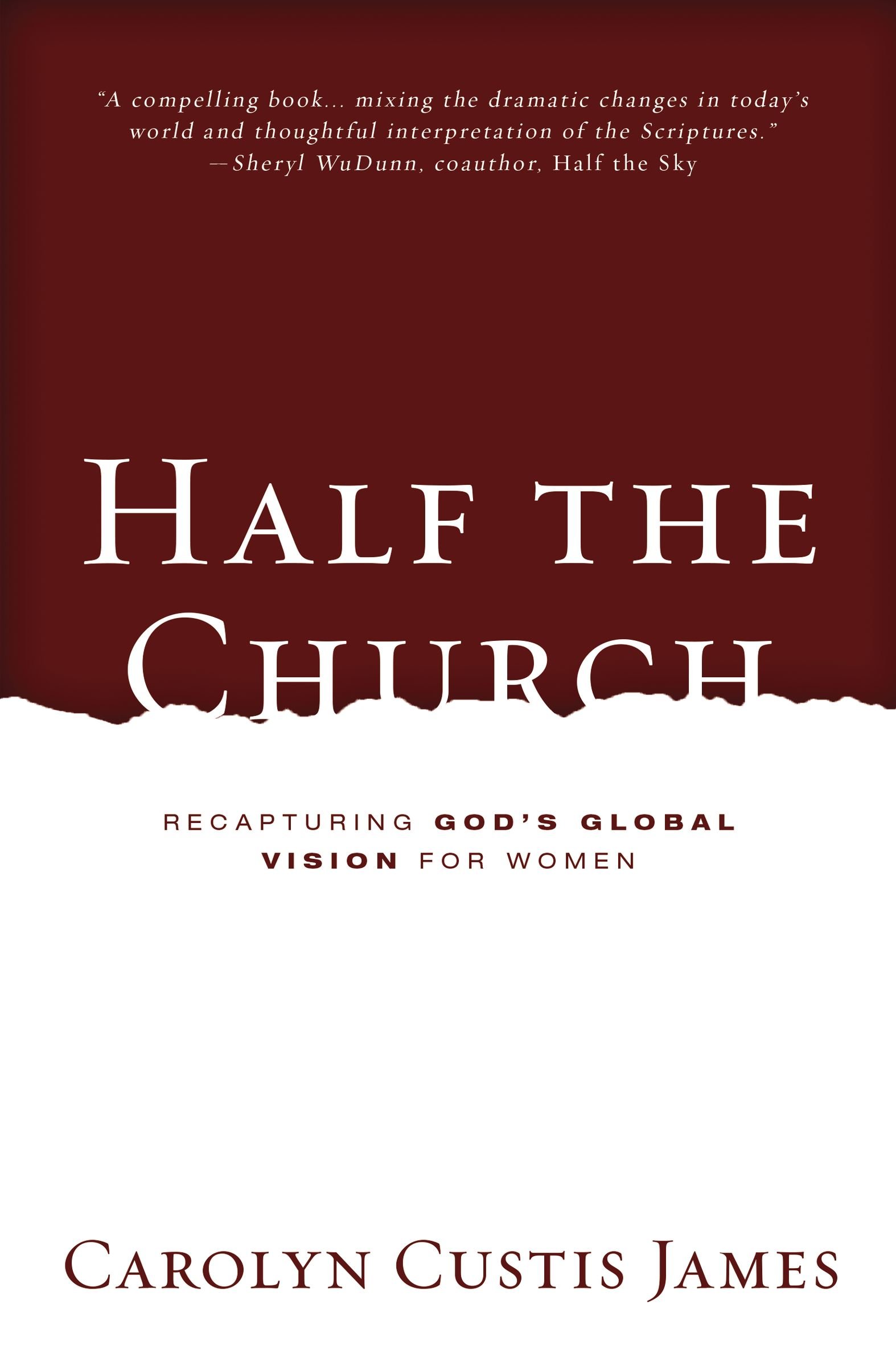 When my copy of Sheryl Sandberg’s new book Lean In: Women, Work, and the Will to Lead arrived, I couldn’t help noticing how much her cover resembles the cover to my Half the Church. My first thought was: “Imitation is the highest form of flattery.” My second thought was: I hope the similarity will cause shoppers to mistake my book for hers.
When my copy of Sheryl Sandberg’s new book Lean In: Women, Work, and the Will to Lead arrived, I couldn’t help noticing how much her cover resembles the cover to my Half the Church. My first thought was: “Imitation is the highest form of flattery.” My second thought was: I hope the similarity will cause shoppers to mistake my book for hers.
As I started reading I noticed a genuine and intriguing connection between the subject matter of both books. Written to different audiences from completely different perspectives, still the overlap of issues is striking. Both books challenge women to take themselves seriously and to deal with internal obstacles that prevent us from bringing our full selves to the mission at hand and from engaging with the men in our lives.
As former U.S. Treasury Department chief of staff, Google vice president of Global Online Sales and Operations, and current Facebook COO, Sandberg’s speaks from an impressive wealth of experience. She’s married with two children, so also faces the challenges of juggling career and home. Christian women juggle too (although most of us do not enjoy her salary).
While acknowledging both the enormous blessings and continuing challenges for women in the workplace, her main concern is with what women do with the opportunities that are opening up to us. She notes that since the 80s women have been earning more college degrees than men, but laments the fact that those numbers aren’t reflected in the number of women in leadership.
“Today and in the United States and the developed world, women are better off than ever. . . . Despite these gains, the percentage of women at the top of corporate America has barely budged over the past decade. A meager twenty-one of the Fortune 500 CEOs are women. Women hold about 14 percent of executive officer positions, 17 percent of board seats, and constitute 18 percent of our elected congressional officials.” (p5)
She points to ways women get in our own way as at least part of the problem and challenges women to lean in.
“We hold ourselves back in ways both big and small, by lacking self-confidence, by not raising our hands, and by pulling back when we should be leaning in. We internalize the negative messages we get throughout our lives—the messages that say it’s wrong to be outspoken, aggressive, more powerful than men. We lower our own expectations of what we can achieve. We continue to do the majority of the housework and child care. We compromise our career goals to make room for partners and children who may not even exist yet. Compared to our male colleagues, fewer of us aspire to senior positions. This is not a list of things other women have done. I have made every mistake on this list. At times, I still do.”(p8)
Having spent over half of my adult life in the business world (a bank systems writer, manager of automated office systems for a hospital, and ultimately with my own business as a software developer in the U.S. and England), I can relate to Sandberg’s concerns. Indeed, what I articulated in Half the Church throws open the door for us to explore how being God’s image bearer applies to our careers, what happens when the ezer enters the workplace, and how the Blessed Alliance shows up there.
Admittedly the situation can be more complex for Christian women. Skill sets required to succeed in our jobs are not qualities the church often encourages or values in women. This leads to an oddly schizophrenic existence—developing strengths, expertise, and leadership skills for our careers, then downsizing ourselves when we cross the threshold of the church. Inside, we’ll typically hear a lot about marriage, motherhood, ministry, and our devotional pursuits—concerns that matter deeply to us. But who’s talking about our careers, not merely as a means of putting bread on the table, but as significant efforts to fulfill our callings as God’s image bearers to rule and subdue and to live fruitful, productive, creative lives? What we do with 40+ hours of the week is not a sidebar to the “real” concerns of women’s lives.
Even diehard complementarian spokesmen John Piper and Wayne Grudem concede that in the public sphere a woman may well be in a position of authority and leadership over men. They write, “when it comes to all the thousands of occupations and professions, with their endlessly varied structures of management, God has chosen not to be specific about which roles men and women should fill.”
Furthermore, in today’s American church the career woman belongs to one of the most rapidly growing and habitually ignored demographics. Yet a huge segment of our lives—40+ hours a week for most of us—is disregarded in discussions about kingdom work. Just recently a Boston attorney expressed bewilderment over “the church’s ambivalence toward my professional life” and the need to leave her “educational pursuits and professional ambition at the [church] door.”
Conversation is needed (and I daresay a lot of men would value this too) to integrate our careers and professional lives into a holistic vision of how Christians live for God in a vast variety of callings. Sandberg affords us that opportunity. The intersection between our concerns and hers shows up right away. According to Sandberg, this isn’t just about women. She writes,
“The laws of economics and many studies of diversity tell us that if we tapped the entire pool of human resources and talent, our collective performance would improve” (p7).
Sounds like the Blessed Alliance to me!
So beginning next week, I’m going to start blogging through Lean In, a chapter a week.
Wednesday, May 1: Chapter 1—”The Leadership Ambition Gap “
Pick up a copy of the book and let’s engage this discussion. No matter where you work or what you do, you’re welcome to participate. Even if you’re at the starting line contemplating a career and entering the workforce or thinking through these issues for someone you love, feel free to join in. One way or another, these issues touch all of our lives.
In the meantime, to give you a preview, here’s the TED talk that gave Sheryl the platform that eventually turned into a book:















I've been debating whether to download it to my iPad. This is just the push I needed. Thanks Carolyn. Looking forward to reading your upcoming blogposts.
Our HR department picks several book titles focusing on the workplace and leadership and makes them available for people to sign up and read and then discuss over the summer. I just emailed and suggested this title be added to the list.
LikeLike
I was so glad to see this invitation to discuss the Lean In philosophy. Having watched Sandberg's Ted talk video some months ago, I've been thinking about how to apply this to the Church. I spent 15 years in the acute hospital setting and another 15 in Christian higher ed. Both of these are more welcoming to women than some professional settings, and my church has women elders and one woman pastor, yet I still relate to your comment about “downsizing ourselves when we cross the threshold of the church”. I checked out the Leanin.org site and was so impressed with the leadership development resoures there – amazing! But as I considered starting a “Lean In Circle” in my area the first thing I thought about was “how do we adapt this to identify as Christ-followers”? I'm looking forward to answering the questions you've posed: 1) how being God’s image bearer applies to our careers, 2) what happens when the ezer enters the workplace, and 3)how the Blessed Alliance shows up there. Developing capable women leaders to serve the church is one of my passions, so thanks for making this happen! Looking forward to some great conversation.
LikeLike
These topics have been simmering in the church for decades. There are just more of us now to engage them together. I was intrigued by Lean In the first time I heard about it. So I'm really looking forward to interacting with others about it.
CJ
LikeLike
JUST this AM put on the To-do list: Find some fabulous women who are reading Lean In. Seriously. I'm so in! FYI, my daughter-in-law's company is requiring them to read it–interesting/cool huh. (wish you could all sit on my den couches…but alas virtual will have to do.) xo
LikeLike
Oh yes: “This leads to an oddly schizophrenic existence—developing strengths, expertise, and leadership skills for our careers, then downsizing ourselves when we cross the threshold of the church.” Church, business…where else? Why do we downsize ourselves at all? That's what I want to understand. What are the internal reasons the female collective struggles with this?
LikeLike
INVESTING in the lives of our children, shaping, growing and enjoying them IS “THE CORNER OFFICE” !! In her opening comments she says she does not know if the right place for women is in the home with their children, or in another workplace. Her concluding remarks prompt women to make sure their jobs are not boring so they won't want to leave. It seems as if she is already “stepping back” and spends the rest of her talk trying to convince herself and other women how to deny the desire God created in us to be with our children. Sure, it's hard to walk away from your child because God rooted those desires in the heart of the mother for the good of both. What a gift, and privilege! An OPPORTUNITY you won't want to miss. LEAN IN TO THE MOST REWARDING CAREER EVER!
LikeLike
I decided to go to Barnes and Noble to simply read the intro of the book and then decide if I'm going to invest in it or not but somehow my pen started underlining uncontrollably. I guess I'm keeping the book. So far, I just have 2 words to describe the book: Validating and confirming!
LikeLike
Melinda and Janet,
You have both raised huge issues that underscore why this discussion is so needed. Why we downsize ourselves and, for working moms, that fierce commitment to our families? Both topics come up in Sandberg's book, so stick with us!
CJ
LikeLike
The diehard complementarians — who state that outside the church, women can hold positions of leadership over men — are forgetting that they foster the idea that it is more spiritual, you know, more close to God if you DON'T. There is this small but steady voice they perpetuate, that if you were REALLY Christian-y, you wouldn't act outside of God's alleged design anywhere you happen to be. It's quite disgusting, actually.
LikeLike
I'm glad someone is talking about the ambition issue. I agree, “There is the perception that ambition is not a virtue for women and is therefore inappropriate.” It's multiplied in Christian organizations. Even when we find a man who is willing to open the door, women are hesitant to enter, lest their motives are questioned. And women leave to find places where ambition are applauded (PTA, food bank, etc.) which are all good but bleed our mainline organization of leadership wealth!
LikeLike
“Furthermore, in today's American church the career woman belongs to one of the most rapidly growing and habitually ignored demographics.”
This is why I finally left my last church. After one sermon where the pastor said “And she decided to honor God by quitting her job and staying home with her kids…” I knew I couldn't stay there anymore. There wasn't a single time they spoke about a woman's career while also being married and/or a mom. I'm ready to wrestle with what it means to be a career minded Christian woman, no matter my parental or marital status.
LikeLike
Despite a stellar year developing two challenging history classes for a classical Christian school, I was informed that I would not be renewed because a young man with a family needed the job more! This individual has failed in all his attempts to teach but his gender (and coaching ability) trumps excellence. Thoughts?
LikeLike
Pingback: Lean In: The Leadership Ambition Gap | Carolyn Custis James